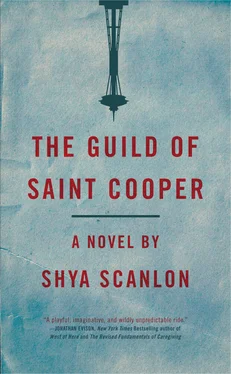I opened my notebook and wrote, Hot again . I scanned the last few pages: all Hot. I found a Hot with showers three weeks back. The journal was a triumph. Still, I found comfort in the ritual, the being alone, pen in hand. The designated space of it. The view. There was some construction going on a few blocks away — an incongruous level of activity amid the largely pacific streets — and I made a commitment to visit the site as I’d made a commitment to visit it days ago when I’d first noticed it. As I’d made a commitment every day since.
I heard a knock at the front door, then Zane called through the house, having let himself in.
“Ma’am?” he said, always polite. “Mrs. Rose?”
“Hey, Zane,” I called down the stairs, “just leave it on the couch, okay? The tomatoes are by the door.”
I held my breath to better hear him padding around. He went as far as the dining room looking for my mother but turned back and paused at the couch, then again at the door, where he grunted softly while lifting the box. My mother had been trading vegetables for pot since the winter, when a crop of rutabagas had surprised us in early January. Before my brother moved, she’d kept her drug use more or less hidden for the sake of Olivia, her granddaughter. She’d since grown bolder.
Zane’s head appeared at the bottom of the stairs.
“How’s your mom?”
Covered with tattoos, his face was nonetheless an honest one, with big blue eyes he put to work mostly, from what I’d seen, in the service of kindness and concern.
“She’s fine,” I said. “She’s a trooper.”
“Good.” He smiled. “How’s the book coming?”
I shrugged. “I need a plot.”
“My boss says plots are for gravestones.”
“He does, does he? I’ll keep that in mind.”
“He says art is born of the individual’s unique response to his own existence.”
“This is some boss you have.”
Zane nodded, kind and concerned.
When he left I returned to my desk and watched the construction for a while. Scaffolding had been erected around a house and men were all over it, doing work I couldn’t quite make out. Presently a whistle blew and they descended below the green canopy. I stared at my mostly blank page.
Long before leaving, my wife Blake had been worried this might happen. To her, my blank pages signified more than the absence of writing; they signified my mood, my moping and irritability. They signified my level of contribution, finally, to the relationship. I’d come upstairs on several occasions to find her standing at my desk, flipping sadly through my journal, gathering evidence. I hadn’t given her children — the least I could do was give her another book.
Of course, she was coming back within the month — at least, she’d said so a year ago. She was coming back to check in, to take me with her. She was coming back to sign divorce papers. Coming back to see what comes next. And when she did, I wanted to have something to show her. But nothing came.
My mother shuffled through the house, and I could hear her clear the coffee table. By the time I got down there she had the bag of weed at her feet and the cigarette machine before her. She was struggling to get a paper in position — a task increasingly difficult for her arthritic, gardener’s hands. I sat beside her, marked her stubborn concentration.
“How are you feeling today, Mom?”
“I’ve been thinking about blood.”
“Not because you saw any, I hope.”
“Your father used to cut himself on the job. He’d come home at least once a month with some nasty gash, and I’d offer to dress it but he’d shrug me off and say, ‘Don’t worry about it, Rosie, I clot fast.’ He had a high platelet count. He was so damn proud of his clotting. He smoked too much, he drank too much, but he always said he’d die of natural causes.”
I put my hand into a pocket of airborne dust frozen by sunlight.
“Anyway, dear, how are you ?”
“Mom.”
She got the paper right, turned to me. “What?” She always did this.
“Nothing. I think I’m going to go take a look at that construction down on…it must be 59th or 58th Street.”
“I think that’s a great idea. There are always plenty of ways to get involved in your community.”
“Well, right. I just want to know what they’re doing. It’s hard to see what’s happening from my room.”
She laughed. “I’ll let that observation go without comment.”
She turned back to her machine, rolled the paper up to the gum line, and brought it to her face. She scrunched her mouth around to summon saliva, then licked.
When she reached down for more pot I noticed a folded piece of paper — a letter, it looked to me. I picked it up and opened it. The text was strangely askew. It looked like a fax, or the product of an ancient, hand-cranked mimeograph machine. Dry splotches of smeared ink interrupted and obscured some of the words, but it remained largely legible. It was addressed to “The Guild of St. Cooper” and bore the title “On Marbles.”
I held the letter up. “What’s this?”
“Zane must have dropped it.”
My mother took a break to rub her crooked hands and asked whom the letter was from. “It just says The Editor .”
The radio crackled again, and we looked at it expectantly.
One day — no one could say exactly when — that radio would roar to life and announce the collapse of the Ross Ice Shelf, a collapse that would cause irreparable damage to the West Antarctic Ice Sheet, trigger a tsunami across the Pacific Ocean, and temporarily raise sea levels as much as fifteen feet. The radio would then fall silent forever, having served its purpose, and Seattle would cease to exist.
I thought this coolly, having trained myself to summon the details without emotion, without fear. This, finally, was what we’d learned here in our city of the future. It was a being toward death not unlike resignation, though without the knight of faith’s heroic slant. Without the transcending irony. It was, rather, the slow enervation of spirit faced by an immovable mover. Sisyphus sitting down.
I looked back at my small, sick mom. She brought another joint to her lips, stuck out her tongue. Everyone wants to die of natural causes, of course. Some are just more impatient than others.
MY YOUNGER BROTHER KENT was a survivor. Actually, he was a mortgage broker who’d taken survivalist training courses on weekends. But he thought the term “survivalist” had negative connotations — was essentially a slur used by those for whom competence and outdoor accountability betrayed emotional shortcomings. “You don’t call yourself a writist, do you?” he’d say to me. He’d taken a course in hunting, dressing, and cooking game in inclement weather. He’d learned how to build shelters using materials natively available in three different climates. He’d learned first aid, CPR, basic firearm skills, and how to navigate by the stars. And he was right: we had thought he was a little high-strung.
But skepticism must finally confront its own limitations. The facts were plain: he’d made sure our mother’s house wouldn’t fall apart before its time; he’d stocked the basement with a Mormon supply of water and food; and he’d filled the out-of-use heating oil tank with diesel. By the time he’d taken his family and headed east, no one was smirking at his hobby. Of course, by then there hadn’t been anyone left to smirk.
As I broke Fred’s house’s basement window I thought of what Kent had said to me before stepping up into the truck that would take his family over the Cascades.
“No one is watching, Blake.”
Читать дальше












